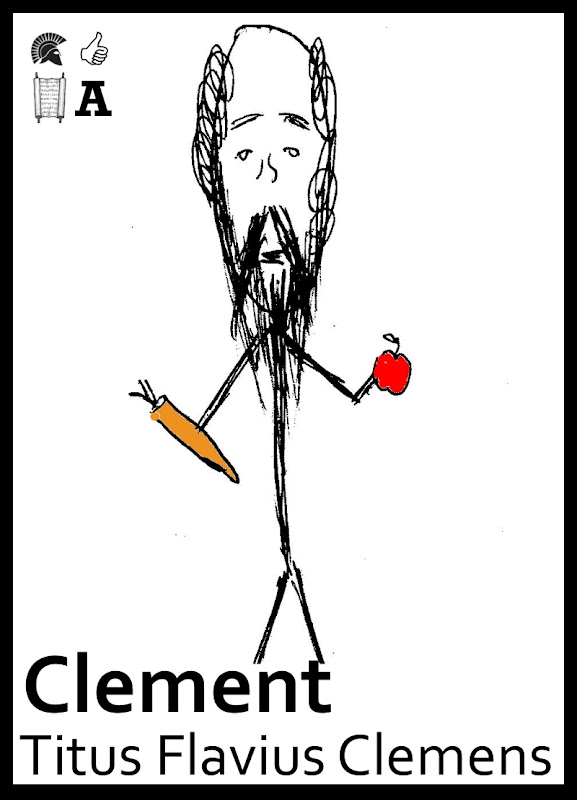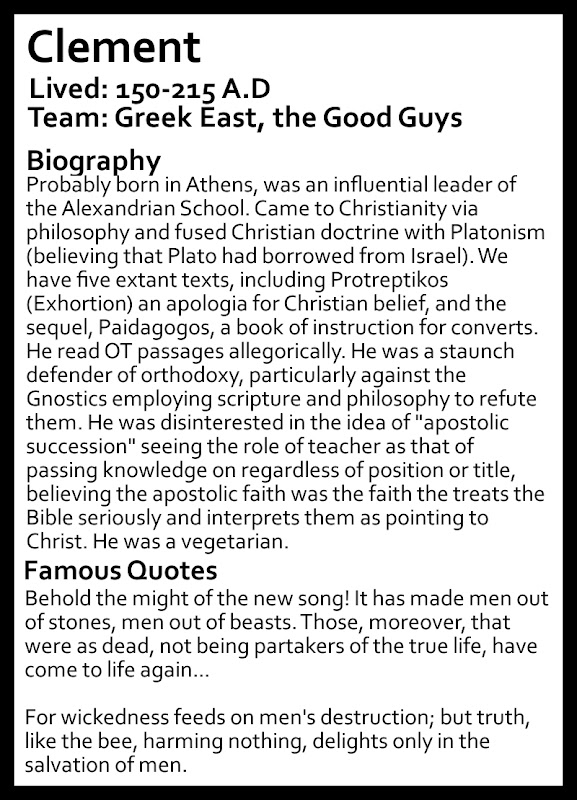Clement was basically the proto-Augustine. Or, you could argue that he followed in Justin Martyr’s footsteps (and his omission from this series thus far will soon be rectified), and that Justin Martyr was the proto-Augustine. Basically his way of thinking and approaching the Greek school of philosophy was pretty similar to Augustine’s approach, and he, like Justin Martyr before him, and Augustine after him (and also like Philo before Justin) claimed that Plato had plagiarised Moses.
He knew Greek philosophy pretty well, and he sought to integrate it into his preaching of the gospel to a pretty educated audience in Alexandria. A city famous for being well educated and culturally sophisticated. Apollos (as in the Apollos of the Bible, as in “I follow Paul, I follow Apollos” also came from Alexandria).
Clement was a vegetarian, and like most vegetarians he had a moral superiority complex so he assumed that Jesus was a vegetarian too. I reckon Jesus hated vegetables, which is why he cursed the fig tree and hung out with fishermen.


Clement liked Plato, and he also liked Pythagoras. Who was the Pythagoras. The c2=a2 + b2 guy who figured out triangles and invented the self-draining siphon cup to play practical jokes on his greedy friends. Pythagoras was from Samos. The whole point of that paragraph was so that I could post this photo of a triangle in Samos.

From Samos
Clement wrote some pretty cool stuff too. Like everybody else who is famous from back then.
There are some good Clement resources here. And you can read his Exhortation here.
I like the motif he uses for the Gospel, that it’s a song that brings life to stone. He intertwines his systematic introduction to the gospel and appeal for conversion with the Bible in a fairly cohesive way – and he intersects that with Greek mythology and theology. He, like Augustine, was a little prone to allegory. Here are some highlights.
The silly are stocks and stones, and still more senseless than stones is a man who is steeped in ignorance. As our witness, let us adduce the voice of prophecy accordant with truth, and bewailing those who are crushed in ignorance and folly: “For God is able of these stones to raise up children to Abraham;” and He, commiserating their great ignorance and hardness of heart who are petrified against the truth, has raised up a seed of piety, sensitive to virtue, of those stones–of the nations, that is, who trusted in stones. Again, therefore, some venomous and false hypocrites, who plotted against righteousness, He once called “a brood of vipers.” But if one of those serpents even is willing to repent, and follows the Word, he becomes a man of God.
Others he figuratively calls wolves, clothed in sheep-skins, meaning thereby monsters of rapacity in human form. And so all such most savage beasts, and all such blocks of stone, the celestial song has transformed into tractable men. “For even we ourselves were sometime foolish, disobedient, deceived, serving divers lusts and pleasures, living in malice and envy, hateful, hating one another.” Thus speaks the apostolic Scripture: “But after that the kindness and love of God our saviour to man appeared, not by works of righteousness which we have done, but according to His mercy, He saved us.”
Wisdom, the celestial Word, is the all-harmonious, melodious, holy instrument of God. What, then, does this instrument–the Word of God, the Lord, the New Song–desire? To open the eyes of the blind, and unstop the ears of the deaf, and to lead the lame or the erring to righteousness, to exhibit God to the foolish, to put a stop to corruption, to conquer death, to reconcile disobedient children to their father. The instrument of God loves mankind. The Lord pities, instructs, exhorts, admonishes, saves, shields, and of His bounty promises us the kingdom of heaven as a reward for learning; and the only advantage He reaps is, that we are saved. For wickedness feeds on men’s destruction; but truth, like the bee, harming nothing, delights only in the salvation of men.
Behold the might of the new song! It has made men out of stones, men out of beasts. Those, moreover, that were as dead, not being partakers of the true life, have come to life again, simply by becoming listeners to this song. It also composed the universe into melodious order, and tuned the discord of the elements to harmonious arrangement, so that the whole world might become harmony. It let loose the fluid ocean, and yet has prevented it from encroaching on the land. The earth, again, which had been in a state of commotion, it has established, and fixed the sea as its boundary. The violence of fire it has softened by the atmosphere, as the Dorian is blended with the Lydian strain; and the harsh cold of the air it has moderated by the embrace of fire, harmoniously arranging these the extreme tones of the universe. And this deathless strain,the support of the whole and the harmony of all,–reaching from the centre to the circumference, and from the extremities to the central part, has harmonized this universal frame of things, not according to the Thracian music, which is like that invented by Jubal, but according to the paternal counsel of God, which fired the zeal of David.
This is the New Song, the manifestation of the Word that was in the beginning, and before the beginning. The Saviour, who existed before, has in recent days appeared. He, who is in Him that truly is, has appeared; for the Word, who “was with God,” and by whom all things were created, has appeared as our Teacher. The Word, who in the beginning bestowed on us life as Creator when He formed us, taught us to live well when He appeared as our Teacher; that as God He might afterwards conduct us to the life which never ends. He did not now for the first time pity us for our error; but He pitied us from the first, from the beginning. But now, at His appearance, lost as we already were, He accomplished our salvation. For that wicked reptile monster, by his enchantments, enslaves and plagues men even till now; inflicting, as seems to me, such barbarous vengeance on them as those who are said to bind the captives to corpses till they rot together. This wicked tyrant and serpent, accordingly, binding fast with the miserable chain of superstition whomsoever he can draw to his side from their birth, to stones, and stocks, and images, and such like idols, may with truth be said to have taken and buried living men with those dead idols, till both suffer corruption together.
I also like his exhortation to renounce pagan customs and turn to God…
“Let us then avoid custom as we would a dangerous headland, or the threatening Charybdis, or the mythic sirens. It chokes man, turns him away from truth, leads him away from life: custom is a snare, a gulf, a pit, a mischievous winnowing fan.”
Starting by presenting a call from Jesus:
This am I, this God wills, this is symphony, this the harmony of the Father, this is the Son, this is Christ, this the Word of God, the arm of the Lord, the power of the universe, the will of the Father; of which things there were images of old, but not all adequate. I desire to restore you according to the original model, that ye may become also like Me. I anoint you with the ungent of faith, by which you throw off corrup tion, and show you the naked form of righteousness by which you ascend to God. Come to Me, all ye that labour and are heavy laden, and I will give you rest. Take My yoke upon you, and learn of Me; for I am meek and lowly in heart: and ye shall find rest to your souls. For My yoke is easy, and My burden light.
And then his response:
Let us haste, let us run, my fellowmen–us, who are God-loving and God-like images of the Word. Let us haste, let us run, let us take His yoke, let us receive, to conduct us to immortality, the good charioteer of men. Let us love Christ. He led the colt with its parent; and having yoked the team of humanity to God, directs His chariot to immortality, hastening clearly to fulfil, by driving now into heaven, what He shadowed forth before by riding into Jerusalem. A spectacle most beautiful to the Father is the eternal Son crowned with victory. Let us aspire, then, after what is good; let us become God-loving men, and obtain the greatest of all things which are incapable of being harmed–God and life. Our helper is the Word; let us put confidence in Him; and never let us be visited with such a craving for silver and gold, and glory, as for the Word of truth Himself. For it will not, it will not be pleasing to God Himself if we value least those things which are worth most, and hold in the highest estimation the manifest enormities and the utter impiety of folly, and ignorance, and thoughtlessness, and idolatry. For not improperly the sons of the philosophers consider that the foolish are guilty of profanity and impiety in whatever they do; and describing ignorance itself as a species of madness, allege that the multitude are nothing but madmen. There is therefore no room to doubt, the Word will say, whether it is better to be sane or insane; but holding on to truth with our teeth, we must with all our might follow God, and in the exercise of wisdom regard all things to be, as they are, His; and besides, having learned that we are the most excellent of His possessions, let us commit ourselves to God, loving the Lord God, and regarding this as our business all our life long.


